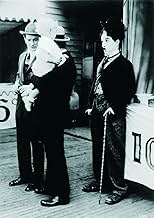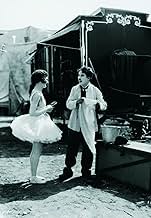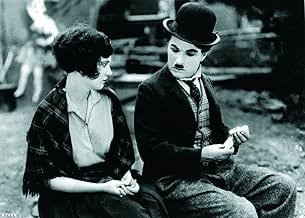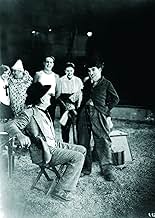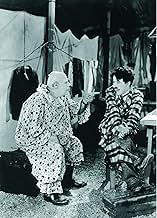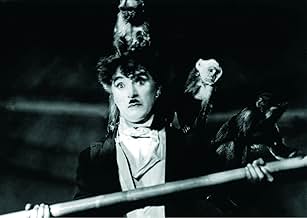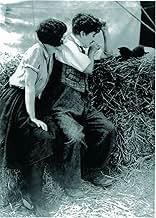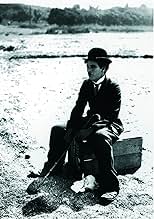NOTE IMDb
8,1/10
38 k
MA NOTE
Charlot trouve du travail et la fille de ses rêves dans un cirque.Charlot trouve du travail et la fille de ses rêves dans un cirque.Charlot trouve du travail et la fille de ses rêves dans un cirque.
- Réalisation
- Scénario
- Casting principal
- Récompenses
- 3 victoires au total
Charles Chaplin
- A Tramp
- (as Charlie Chaplin)
Al Ernest Garcia
- The Circus Proprietor and Ring Master
- (as Allan Garcia)
Tiny Sandford
- The Head Property Man
- (as Stanley J. Sandford)
Albert Austin
- Clown
- (non crédité)
Chester A. Bachman
- Cop
- (non crédité)
Eugene Barry
- Cop
- (non crédité)
Jack Bernard
- Man in Circus Audience
- (non crédité)
Stanley Blystone
- Cop
- (non crédité)
Heinie Conklin
- Clown
- (non crédité)
Toraichi Kono
- Man in Circus Audience
- (non confirmé)
- (non crédité)
H.L. Kyle
- Man in Circus Audience
- (non crédité)
Betty Morrissey
- The Vanishing Lady
- (non crédité)
Avis à la une
Do not be mislead by the ne'er do wells who claim this movie as Chaplin's weakest.
The plot is not intricate, but Charlie doesn't need an intricate plot to make us laugh out loud. "The Circus" proves this.
Saying that this film is boring is perfectly ridiculous: there are many moments of pure Chaplin genius and, if nothing else, you simply must see this film for the tightrope-walking scene. No, it's not trick photography: that's really Charlie tightrope walking with no stuntmen of any kind. If THAT'S not exciting, I don't know what is.
Oh, and just as a side note, this film was made during a time when Charlie was going through a very dirty and very public divorce-- his ex successful at having his funds frozen during the divorce, he was sued for a million in back-taxes and faced possible jail time, AND the ENTIRE SET to the circus burned down in a fire.
He most definitely deserved the special Oscar he received for this film. That's right: OSCAR.
The plot is not intricate, but Charlie doesn't need an intricate plot to make us laugh out loud. "The Circus" proves this.
Saying that this film is boring is perfectly ridiculous: there are many moments of pure Chaplin genius and, if nothing else, you simply must see this film for the tightrope-walking scene. No, it's not trick photography: that's really Charlie tightrope walking with no stuntmen of any kind. If THAT'S not exciting, I don't know what is.
Oh, and just as a side note, this film was made during a time when Charlie was going through a very dirty and very public divorce-- his ex successful at having his funds frozen during the divorce, he was sued for a million in back-taxes and faced possible jail time, AND the ENTIRE SET to the circus burned down in a fire.
He most definitely deserved the special Oscar he received for this film. That's right: OSCAR.
Although movie buffs seldom mention `The Circus' in the same breath as Charlie Chaplin's more touted masterpieces (`City Lights,' `Modern Times,' `The Gold Rush'), this film contains some of his best work manifested in a number of ingenious sequences. Chaplin once again dons the role of the tramp, this time having all sorts of adventures (and misadventures) under the big top.
In order to evade the police who suspect him of being a thief, the tramp ducks into a circus tent and acts as if he is part of the show. The cops follow him into the tent and try to apprehend him, with comical results. The crowd goes wild, believing all this was planned ahead of time. The audience's reaction is so strong that the tyrannical circus owner hires him on the spot. When it is discovered that Chaplin cannot be funny intentionally, the owner gives him a job as a prop man, clumsily lugging equipment around the tent as part of the show. Again the crowd roars its approval at his inadvertent antics, and soon the tramp is the circus' main attraction. In the meantime, he falls in love with the owner's daughter, a bareback rider who herself loves the tightrope walker, and romantic complications ensue.
`The Circus' is an all-around Chaplin effort. In addition to playing the lead role, he wrote, directed, produced and edited it, and composed the music as well. It is a meticulous production on all counts, with each sequence choreographed to elicit the maximum capacity of laughter from the audience. The scenes in which the tramp is pursued through a hall of mirrors, trapped inside the lion's cage, and forced to double for the missing tightrope walker stand alongside his finest achievements. The ending sequence is especially heartrending, as many are in his films. Here is a movie to be cherished by all fans of Chaplin, but appreciated even by casual viewers. This is because it achieves a rare blend of comedy and poignancy through appealing, sympathetic characters and with genuine honesty adding a note of realism to counterbalance the clowning.
In order to evade the police who suspect him of being a thief, the tramp ducks into a circus tent and acts as if he is part of the show. The cops follow him into the tent and try to apprehend him, with comical results. The crowd goes wild, believing all this was planned ahead of time. The audience's reaction is so strong that the tyrannical circus owner hires him on the spot. When it is discovered that Chaplin cannot be funny intentionally, the owner gives him a job as a prop man, clumsily lugging equipment around the tent as part of the show. Again the crowd roars its approval at his inadvertent antics, and soon the tramp is the circus' main attraction. In the meantime, he falls in love with the owner's daughter, a bareback rider who herself loves the tightrope walker, and romantic complications ensue.
`The Circus' is an all-around Chaplin effort. In addition to playing the lead role, he wrote, directed, produced and edited it, and composed the music as well. It is a meticulous production on all counts, with each sequence choreographed to elicit the maximum capacity of laughter from the audience. The scenes in which the tramp is pursued through a hall of mirrors, trapped inside the lion's cage, and forced to double for the missing tightrope walker stand alongside his finest achievements. The ending sequence is especially heartrending, as many are in his films. Here is a movie to be cherished by all fans of Chaplin, but appreciated even by casual viewers. This is because it achieves a rare blend of comedy and poignancy through appealing, sympathetic characters and with genuine honesty adding a note of realism to counterbalance the clowning.
When Charlie Chaplin first plods onto screen in The Circus, he has his back to us. Unusual for any other leading man, but Chaplin was such a legendary icon, even now when he was only making one film every few years, his mere outline was enough to announce his presence. But with such a status came a certain weariness, and The Circus is one of a number of pictures in which Chaplin lampoons the whole process that made his name.
A lot of the business in The Circus is about Chaplin's ability to be naturally comical, and the shortcomings of being an employed comedian. It's interesting how, more than any Chaplin picture that came before or after, The Circus seems to be putting us (the audience) into the little tramp's experience. There are a number of point of view shots, and often characters addressing Charlie are virtually staring into the lens, as opposed to the profile shots he usually stuck to. Even the shots in the ring do not give us the perspective of the big top crowd, and instead the camera looks in on the action from the performers' entrance. The camera is always in the sawdust and never the stalls. This is, from its very first scene, clearly a backstage movie. It may seem a subtle shift but Chaplin is certainly drawing us more to focusing on the lives of circus folk and away from thinking of the circus as entertainment. It's notable too that Chaplin's best comedy vignettes occur outside the big top.
It seems Chaplin was increasingly giving larger and more substantial roles to his leading ladies. Oddly however, while Merna Kennedy plays the most fleshed-out female lead of any Chaplin picture to date, she seems less of a focus for the camera, which barely lingers on her. From what we can see she is not bad, but she lacks the calm dignity of Edna Purviance and Georgia Hale, or at least does not get to display such a thing. More reassuringly, there is a decent-sized part for Chaplin regular Henry Bergman as an old clown. Bergman had been a comedy performer for decades, and had even worked in a real circus in his youth, so he certainly knew what this role was about. With some heartfelt facial acting amongst all his usual huffing and puffing about, it is probably his finest performance.
If The Circus is known for anything, it tends to be the very fact that it is not as well known as many of Chaplin's other features. Chaplin himself does not even mention it in his autobiography (the imaginatively titled "My autobiography" – but then again, being the legend that he is, he doesn't need a punchy title to promote his own name). But far from neglecting the work, Chaplin gave it surely his neatest and most delicate update-job when he came to overhaul all his silent features for re-release in the 60s and 70s. Unlike The Kid and A Woman of Paris, from which he cut several scenes, and The Gold Rush, which he all but butchered in 1943, The Circus is left intact. He also treats it to its own theme song, under which the opening credits are inter-cut with shots of Kennedy on the trapeze, creating the most tender and lyrical opening of all his pictures.
A lot of the business in The Circus is about Chaplin's ability to be naturally comical, and the shortcomings of being an employed comedian. It's interesting how, more than any Chaplin picture that came before or after, The Circus seems to be putting us (the audience) into the little tramp's experience. There are a number of point of view shots, and often characters addressing Charlie are virtually staring into the lens, as opposed to the profile shots he usually stuck to. Even the shots in the ring do not give us the perspective of the big top crowd, and instead the camera looks in on the action from the performers' entrance. The camera is always in the sawdust and never the stalls. This is, from its very first scene, clearly a backstage movie. It may seem a subtle shift but Chaplin is certainly drawing us more to focusing on the lives of circus folk and away from thinking of the circus as entertainment. It's notable too that Chaplin's best comedy vignettes occur outside the big top.
It seems Chaplin was increasingly giving larger and more substantial roles to his leading ladies. Oddly however, while Merna Kennedy plays the most fleshed-out female lead of any Chaplin picture to date, she seems less of a focus for the camera, which barely lingers on her. From what we can see she is not bad, but she lacks the calm dignity of Edna Purviance and Georgia Hale, or at least does not get to display such a thing. More reassuringly, there is a decent-sized part for Chaplin regular Henry Bergman as an old clown. Bergman had been a comedy performer for decades, and had even worked in a real circus in his youth, so he certainly knew what this role was about. With some heartfelt facial acting amongst all his usual huffing and puffing about, it is probably his finest performance.
If The Circus is known for anything, it tends to be the very fact that it is not as well known as many of Chaplin's other features. Chaplin himself does not even mention it in his autobiography (the imaginatively titled "My autobiography" – but then again, being the legend that he is, he doesn't need a punchy title to promote his own name). But far from neglecting the work, Chaplin gave it surely his neatest and most delicate update-job when he came to overhaul all his silent features for re-release in the 60s and 70s. Unlike The Kid and A Woman of Paris, from which he cut several scenes, and The Gold Rush, which he all but butchered in 1943, The Circus is left intact. He also treats it to its own theme song, under which the opening credits are inter-cut with shots of Kennedy on the trapeze, creating the most tender and lyrical opening of all his pictures.
The Circus was both my first silent film and the first film I've watched by Charles Chaplin. Being my first silent film i thought for sure i would be bored to death, but was i wrong. The film was really funny, made me laugh out loud. The comedy in this film is very different to the comedy in films now a days. Now a days most comedy films are big on the special effects and just lame humor. In the circus the actors have actual talent, they have to be very good at showing there emotion, like facial expressions and things like that.I was amazed on how well the movie was, Charlie Chaplin is great and i hope soon i can get my hands on some more of his films. I almost wish they could make a films like this today just maybe with some color, i think it'd be a great idea.
Perhaps this doesn't have quite the reputation of Charlie Chaplin's greatest movies, but it is very entertaining, and it's a good showcase both for his comic genius and also for his skill as a film-maker. It's full of very funny routines along with plenty of action, with enough of a story to make you care about the characters, too.
The setting in "The Circus" certainly gives Chaplin a lot of ready-made material, and he makes the most of it, coming up with hilarious routines involving everything from a hall of mirrors to a lion. His 'Tramp' character gets involved in all kinds of amusing predicaments that involve several other interesting characters. Most of it keeps a pretty light tone, which makes the serious parts that much more effective. And there are several sequences which, though perhaps not as well known as some of the scenes from other Chaplin films, are quite funny and creative.
With plenty of humor and Chaplin's trademark sympathetic characters, this is a very enjoyable feature for anyone who appreciates classic comedy.
The setting in "The Circus" certainly gives Chaplin a lot of ready-made material, and he makes the most of it, coming up with hilarious routines involving everything from a hall of mirrors to a lion. His 'Tramp' character gets involved in all kinds of amusing predicaments that involve several other interesting characters. Most of it keeps a pretty light tone, which makes the serious parts that much more effective. And there are several sequences which, though perhaps not as well known as some of the scenes from other Chaplin films, are quite funny and creative.
With plenty of humor and Chaplin's trademark sympathetic characters, this is a very enjoyable feature for anyone who appreciates classic comedy.
Le saviez-vous
- AnecdotesIn the 1969 reissue, the 80-year-old Sir Charles Chaplin sang the title song.
- GaffesAfter the tramp washes the shaving cream from his face, he dries himself with a towel, but the towel never touches his face. (This is probably so that it won't mess up the stage makeup.)
- Citations
The Circus Proprietor and Ring Master: Go ahead and be funny.
- Versions alternativesCharles Chaplin replaced the original credits of this film when he reissued it in 1969. In their place, there is an opening scene featuring Merna Kennedy on the trapeze while Chaplin sings a song, then the image fades to the credits of that version with no cast nor technical credits.
- ConnexionsFeatured in The Circus: Premiere (1928)
Meilleurs choix
Connectez-vous pour évaluer et suivre la liste de favoris afin de recevoir des recommandations personnalisées
Détails
- Date de sortie
- Pays d’origine
- Sites officiels
- Langues
- Aussi connu sous le nom de
- The Circus
- Lieux de tournage
- Glendale, Californie, États-Unis(ending exterior scenes - the circus wagons depart south on Verdugo Rd. from Glenoaks Blvd.)
- Société de production
- Voir plus de crédits d'entreprise sur IMDbPro
Box-office
- Budget
- 900 000 $US (estimé)
- Montant brut mondial
- 33 854 $US
- Durée1 heure 12 minutes
- Couleur
- Mixage
- Rapport de forme
- 1.33 : 1
Contribuer à cette page
Suggérer une modification ou ajouter du contenu manquant


